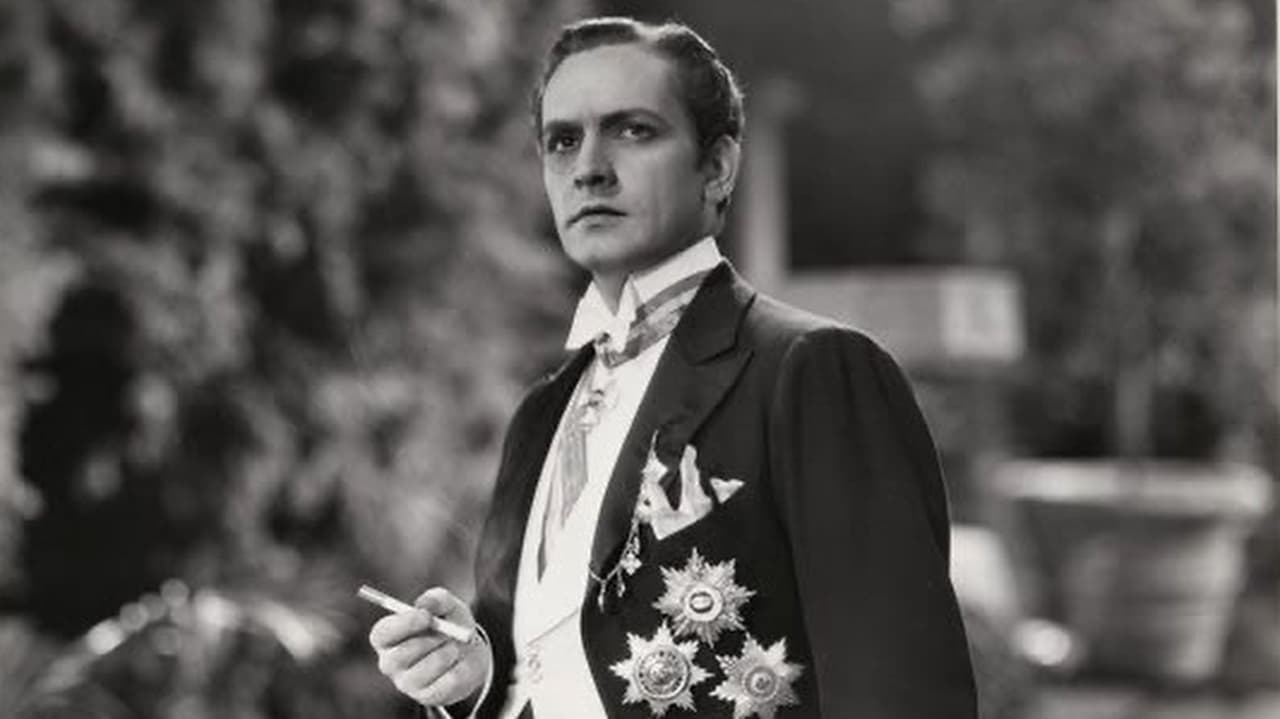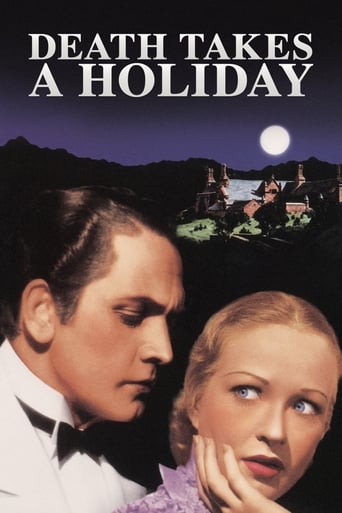GurlyIamBeach
Instant Favorite.
Supelice
Dreadfully Boring
pointyfilippa
The movie runs out of plot and jokes well before the end of a two-hour running time, long for a light comedy.
Myron Clemons
A film of deceptively outspoken contemporary relevance, this is cinema at its most alert, alarming and alive.
mark.waltz
Forget about the green mist of "The Ten Commandments" skipping doors with blood painted on them, or the cloaked skeleton pointing his dinner at a bunch of people who ate the Salmon Moose in "Monty Python's The Meaning of Life", or even the comical figure on "Family Guy". This view of the angel of death is profound, almost romantic, with sincerity and integrity. "Has it ever occurred to you that death may be more simpler than life?", Death (Fredric March) asks. I certainly hope so!Appearing to Sir Guy Standing as an unfaced dark mist, he tells him (in March's voice) that he will be soon joining them in the guise of the Russian nobleman scheduled to visit them that "won't be there himself". All but Standing believe him to be this member of the Russian aristocracy, and as his dark presence creates discord, life is saved for aging flowers, accident victims (seen in presumed newsreel footage) and the aging certain to die as soon as he returns to his duties. Death searches for love during his brief visit with life, finding only fear in the souls of two of the beautiful women (Gail Patrick and Katherine Alexander) in attendance. Only one, the sweet Evelyn Venable, whose purity touches him, does not fear him, and this creates fear in the family as well as their visitors as they comprehend the truth.Almost operatic in its tragedy, this actually did become a critically acclaimed Off-Broadway musical drama. The film version of the stage play is solemn, yet not depressing or morbid. It certainly constitutes discussion, and "Death", itself, makes observations about the selfishness of the living in not accepting the act of death as part of life, and not letting the dead rest in peace.Venable's demeanor of the gentile noblewoman is almost saintly, as she seems to welcome Death's presence in her life without even an ounce of fear while her parents (Katherine Howard and Henry Travers) obviously have the earthly view of "She's too young to be taken" and "What will we do without her?". The beloved Helen Westley is sweetly noble as Standing's wife, while her matriarchal character in the musical became a maturing beauty played by the striking Rebecca Luker. While the title indicates that this could be either a comedy or a horror movie, it is in fact, a love story of two worlds forbidden from meeting, let alone falling in love. Of course, the cinematography is at times almost like the early sound horror movies, and it is indeed haunting. Director Mitchell Leisen prevents it from ever becoming sappy or mellow, and at the end, you might feel that the two forbidden lovers are triumphant.
A_Different_Drummer
Here is the biggest "spoiler" this review is going to offer: ignore the remake. Yes, I know the remake has Brad Pitt and Sir Tony Hopkins and about (it seems) a 6-hour run time - yawn - whereas this poor original, in contrast, "only" has Frederick March and about an 80 minute run time and special effects from the 1930s. Seems no contest? It is. Ignore the modern version, it is junk. See this, the original, based very closely on the original stage play, with March giving one of the best performances of this career (by the 1950s, some 20 years later, this great actor, with a mesmerizing physical presence, was reduced to B movies. Same thing happened to Rita Hayworth). The story is a one-of and as far as this reviewer is concerned, un-equalled even today. Death gets bored, wants to experience physical life, wants to experience love. Takes the form of a visiting prince at a gathering of upper class wealthy types (in films and plays of that era, the upper class were always visiting each other or partying or philosophizing). After warning his host not to reveal his true identity, Death in human form tries to mingle. And that's all the spoiler you get. Astonishing writing, deft dialogue, an odd mixture of horror story, love story, and suspense story. I would without hesitation call this one of the best 100 films of all time, and my reviews here show that I have seen my share to judge from.
theowinthrop
There is a subject that might be brought into the sphere of a masters degree thesis: how the destruction and death of World War I created a wave of theatrical and cinematic creativity dealing with life after death, and that death is not an ending but a beginning. This trend mirrored the rise of spiritualism (as pushed and advocated by Sir Arthur Conan Doyle, Sir Oliver Lodge, and others) as a way of healing the real emotional losses felt by millions of people around the world after 1914 - 1918. It produced some works of stage and screen such as the anti-war FIFTY MILLION GHOSTS (attacking armaments king Basil Zaharoff - young Orson Welles appeared on stage in it), the play and film OUTWARD BOUND by Sutton Vane, and (probably best of all) Albert Casella's classic DEATH TAKES A HOLIDAY. It's still produced occasionally, and even made it to a television version (in 1971) and a recent remake (MEET JOE BLACK).Supposedly, as the "Lusitania" was going to the bottom of the Irish Sea, producer Charles Frohman said to his friends standing with him on deck, "Why fear death? It is the most beautiful adventure in life?" or words to that effect. Frohman (who did drown in the disaster) was quoting the words of his close friend and business associate James Barrie from PETER PAN. In a sense, Casella's story follows this particular point of view. Death (Fredric March) has come to the palazzo of Duke Lambert (Sir Guy Standing) and is intent on taking his daughter Grazia (Evelyn Venable), but instead makes a deal. He has heard a great deal about the human emotion of love, and has never experienced it. Instead, the only experience with human beings he has had was fear. So, he will not take any of Lambert's guests, family, or friends on this visit, if Lambert will allow him to stay as "Prince Sirki", a recently deceased nobleman whose form is available. Lambert agrees.The film actually (like the play) is quite probing, into the nature of death, love, and life itself. We see the various people who are in the palazzo, some of whom have lives of pleasure or adventure, and March constantly finds small flaws in these things that the humans overlook. When he meets one who races at high speed, he asks (straightforwardly, but with a heavy ironic undertone), "Why haven't we met before?" Henry Travers in a supporting role is a lover of fine food and drink - and obviously he too may soon meet March again under different circumstances.But it is Venable who is the key to March's humanization. She is not impressed by the wonders of life and the world her friends push. She seeks something more meaningful. A beautiful woman, she is pursued in the film (by Carrado - Kent Taylor), but finds his heavy sensual love not what she wants. It is only with March, also seeking an answer, that she finds the match to herself.March too is pursued, by the social climbing Gail Patrick and Helen Westley, and both are quickly shown the valuelessness of "titles" and status. March willingly shows them (briefly) his real self, and they flee him in terror. Both March and Veneble are incomplete: he by the seeming void in his eternal duty of ending life and being feared for it, she by her realizing what the book of ECCLESIASTES said two thousand years ago that is still true: "Vanity of Vanities...all is vanity!". The one exception is true love, and both find that in each other that goal is met. So at the end Grazia willingly goes with Sirki, because there is no fear for both when together - for together they can face the universe and eternity.
MartinHafer
As is usually the case, the original version of this story is better than the remake. So, why not get a hold of the original instead and see the story at its best.Frederick March is an unusually handsome version of the Angel of Death. Inexplicably, he decides to STOP killing people temporarily so he can live as a mortal and see what life is like for them. Unfortunately, he falls in love in the process AND the world soon discovers that having NO ONE die isn't necessarily a good thing--those who would normally die are forced to live in pain and misery until March decides to return to his former self.See it--it's well worth the trouble looking for it.

